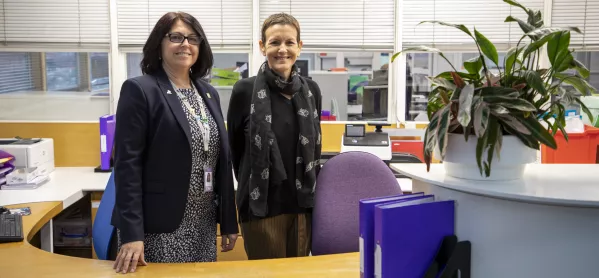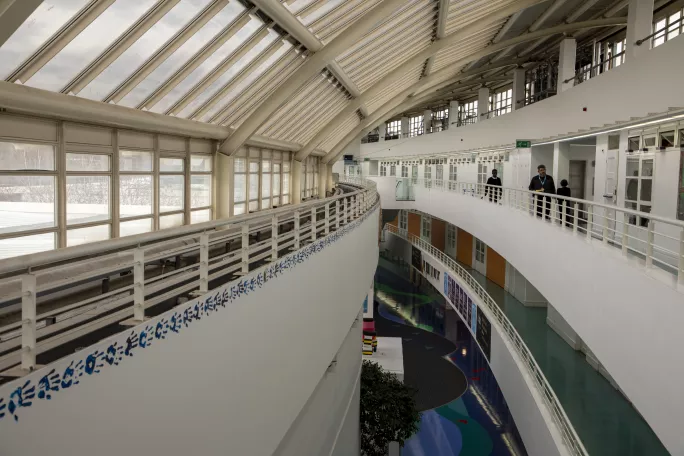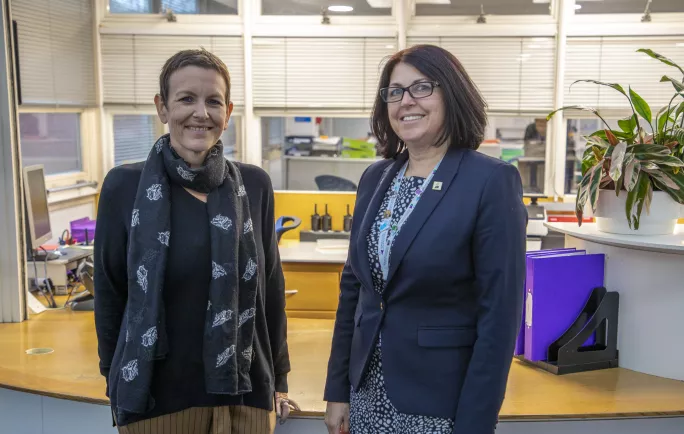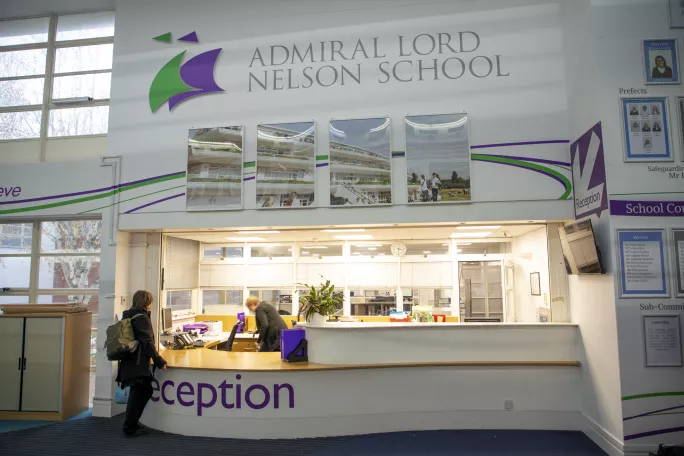- Home
- ‘If you’re creative, you can always avoid exclusions’
‘If you’re creative, you can always avoid exclusions’

Gazing out of the windows that line the vast white walls of Admiral Lord Nelson School, you could be stood on the deck of a colossal ocean liner, embarking on a voyage.
It is no surprise that this building is home to a school lauded for its creativity. Inspired by the ships that frequent Portsmouth’s historic harbours, Admiral Lord Nelson School (ALNS) is heavily influenced by the city’s maritime heritage. There are three levels, or “decks” - each lined with classrooms - and an impressive curved roof.
Perhaps the building’s most striking feature is its transparency; the majority of the walls, both interior and exterior, are made of glass. Headteacher Nys Hardingham (pictured above - left) says this design promotes inclusivity. Without such openness, she argues, creativity would be stifled.
Watch: Five ways schools can boost creativity
Exclusive: England opts out of new Pisa creativity test
Viewpoint: Don’t set homework - get students to find a new hobby
“This isn’t a school that’s got much in the way of corridors or hidden places,” she says. “It’s very open and inclusive in terms of how it welcomes you to interact with it as a building.
“It was also designed white, with lots of wall space for display, so we have some wonderful displays around the place that sing and celebrate about what we are and what we do and what we believe in. The children are very good at respecting that, and just enjoying that, because we don’t have that sort of tight-corridor, bustling feel.”
Named creative school of the year at the Tes Schools Awards 2019, ALNS serves as an inspiration to any school keen to promote creativity across the curriculum, from maths and science to art and drama.
The school takes a compassionate approach to teaching and learning, putting inclusivity and wellbeing at the top of the agenda.
“I think it’s important to see education not as acquiring a body of knowledge, not as acquiring a particular character or a particular way to be, but about unleashing the potential in individuals and trying to have that ethos from everybody - from the leadership of the school to the staff, from the staff to the students,” Hardingham says.

“I think an acknowledgment of feelings is also important. When you think about our core values: inclusivity, wellbeing and high expectations, [you need inclusivity because] you don’t have the freedom to express yourself unless you belong. So, you absolutely have to have that core sense of belonging to start off with.
“Then you also need the wellbeing to feel in the right place to be able to learn well; to be able to go outside of your comfort zone; to be able to bring your own thinking to something and not feel defensive or challenged around that. So, those elements around your security and feeling supported are essential before you’re in any position to try and achieve excellence in anything.”
The focus on inclusivity and wellbeing goes right to the heart of the school’s ethos, with every pupil been seen as a member of the ALNS family. Hardingham insists that she is “absolutely, vehemently opposed” to permanent exclusions, and prefers to run on-site alternative provision for those children who struggle with mainstream education.
“I don’t know how I can stand up and say to parents or to children ‘Once you’re part of ALNS, you’re part of it for life’, I don’t know how I can look them in the eye and say ‘You’re always included’ - and then say ‘except when this happens…’,” she explains.
“There is always a creative solution if you’re prepared to work collaboratively and to think outside the box.”
When it comes to embracing creativity across the board, Hardingham says it is important to start with an open mind.
Children must have the “freedom to explore and challenge”, she says, and “to find solutions to problems or situations that arise”, as well as the opportunity to create things themselves.
She adds: “We try and empower our staff to lead themselves, to create their own solutions. It’s about having an environment that encourages and embraces challenge, because challenge is about looking at something and saying: ‘I’d like to do that differently. I’d like that to be different.’ I think you have to have a brain that thinks in that sort of way.”

The children at ALNS are certainly encouraged to know their own minds. Last year, the pupils participated in a whole-school vote to choose their house names, which have a nautical theme: Mary Rose, Spinnaker, Victory and Warrior.
“We held an election - as you would hold a normal election - during the course of the school day, with a polling station, and the students came and they filled in their voting slips,” Hardingham says.
“When you don’t have an ethos of ‘We tell you what to do’, that creates its own natural challenges, because they expect to have a voice a lot. And so this is a school where there’s a lot of talking and listening.”
At ALNS, creativity can also mean putting a new spin on a familiar idea. The school prides itself on its “personal development curriculum”, which balances traditional subject knowledge with social, moral, spiritual and cultural education.
The pupils take part in 12 “personal development days” every year, when the usual timetable for the whole school is suspended. The themed days aim to develop the pupils’ personal learning and thinking skills - and have also been known to add a little magic to the curriculum.
“We had a Harry Potter day for Year 7 a couple of weeks ago, so they played quidditch in the hall, they designed their own wands in art, they did potions and spells in science, they looked at mythical creatures as part of classics and humanities,” Hardingham says.
“One of the days is a CSI day. There’s another one that’s a stock market challenge, so it’s about creatively applying your thinking but in a mathematical way because you’re trying to maximise profits.”
Gesturing towards the school garden, Hardingham says the pupils also grow their own vegetables, which are used in the food tech classroom, kitchen and canteen.

“What we do here is not just about doing our job, it’s about educating a young person, and that happens in every single interaction,” she says.
“Even our interactions at the catering counters - the type of food that’s produced, or how it looks - that’s all an opportunity for the children to be involved.”
It is not the first time the school has been recognised for its commitment to creativity. It was the first in the country to win a double-platinum Artsmark Award from Arts Council England in recognition of its excellence in cultural education. It also boasts a Rights Respecting Schools Gold Award from Unicef and the International Schools Award from the British Council, which is presented to schools that demonstrate a commitment to global learning.
However, ALNS’ latest accolade came as something of a surprise. Hardingham says the Tes Schools Awards nomination was driven by senior leader for personal development and director of performance Julia Wisbey.
“Julia, in recent years, has got very, very good at finding ways to showcase and celebrate what we do,” she says.
“So she came back after the Easter holidays and said: ‘Nys, I’m not sure how you’re going to feel about this, but I thought I would just enter us for the Tes awards. So I wrote some bits and then they contacted me in the holidays - and I can’t believe it, but we’ve been nominated for two awards!’
“I didn’t even know that she’d put us forward for it. So that was a wonderful surprise. I was a bit dumbfounded, to be honest, to think we had been awarded this above all the amazing primary, secondary and special schools across the whole of the UK. It’s quite stupefying.”
Keep reading for just £1 per month
You've reached your limit of free articles this month. Subscribe for £1 per month for three months and get:
- Unlimited access to all Tes magazine content
- Exclusive subscriber-only stories
- Award-winning email newsletters



